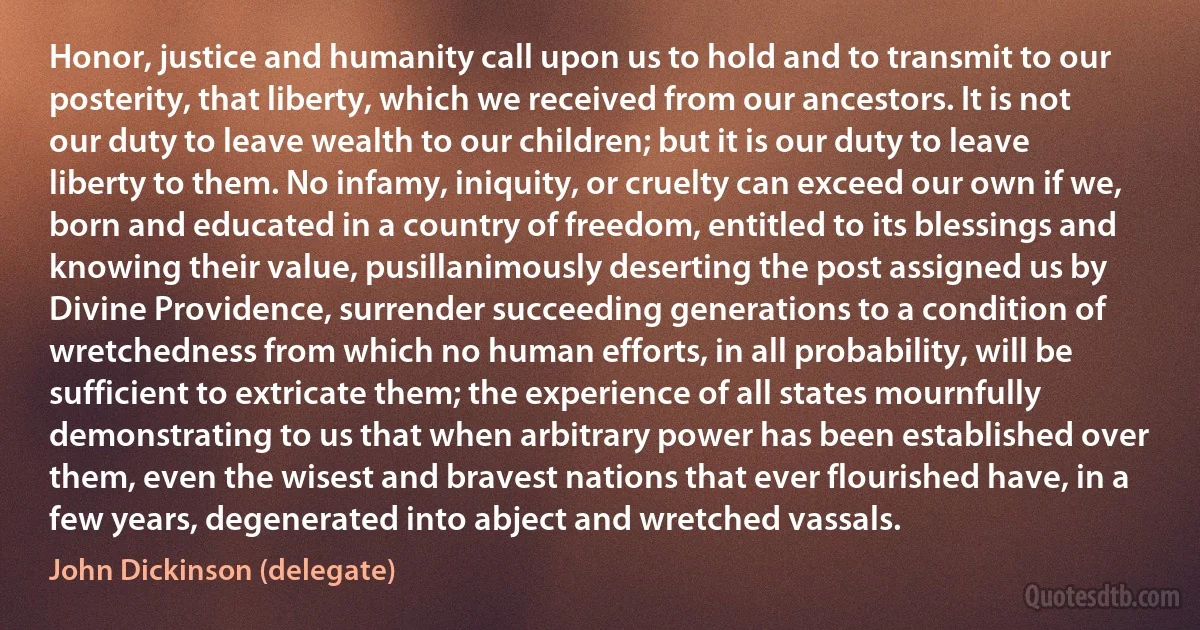
Honor, justice and humanity call upon us to hold and to transmit to our posterity, that liberty, which we received from our ancestors. It is not our duty to leave wealth to our children; but it is our duty to leave liberty to them. No infamy, iniquity, or cruelty can exceed our own if we, born and educated in a country of freedom, entitled to its blessings and knowing their value, pusillanimously deserting the post assigned us by Divine Providence, surrender succeeding generations to a condition of wretchedness from which no human efforts, in all probability, will be sufficient to extricate them; the experience of all states mournfully demonstrating to us that when arbitrary power has been established over them, even the wisest and bravest nations that ever flourished have, in a few years, degenerated into abject and wretched vassals.
John Dickinson (delegate)Related topics
abject arbitrary born call children condition country divine duty experience few freedom hold honor human justice knowing leave liberty power probability providence value wealth wretchedness years statesRelated quotes
Since, however, reason compels us to plunge into the very depth of narrative, we conceive we should not be silent, but, expounding the tenets of the several schools with minute ness, we shall evince reserve in nothing. Now it seems expedient, even at the expense of a more protracted investigation, not to shrink from labour; for we shall leave behind us no trifling auxiliary to human life against the recurrence of error, when all are made to behold, in an obvious light, the clandestine rites of these men, and the secret orgies which, retaining under their management, they deliver to the initiated only. But none will refute these, save the Holy Spirit bequeathed unto the Church, which the Apostles having in the first instance received, have transmitted to those who have rightly believed.

Hippolytus of Rome
These are some of our American standards. These principles, in the province to which they relate, bestow upon the people all there is to bestow. They recognize in the people all that there is to recognize. They are the ultimates. There is no beyond. They are solely for the benefit and advantage of all the people. If any change is made in these principles it will not be by giving more to the people, but by taking from them something of that which they now have. It cannot be progress. It must be reaction. I do not say that we, as citizens, have always held ourselves to a proper observance of these standards towards each other, but we have nevertheless established them and declared our duty to be obedience to them. This is the American ideal of ordered liberty under the law. It calls for rigid discipline.

Calvin Coolidge
The Filipino, it seems, has lost his soul, his dignity, and his courage. We have come upon a phase of our history when ideals are only a veneer for greed and power, (in public and private affairs) when devotion to duty and dedication to a public trust are to be weighted at all times against private advantages and personal gain, and when loyalties can be traded...Our government is in the iron grip of venality, its treasury is barren, its resources are wasted, its civil service is slothful and indifferent, its armed forces demoralized and its councils sterile. We are in crisis. You know that the government treasury is empty. Only by severe self-denial will there be hope for recovery within the next year...This nation can be great again. This I have said over and over. It is my articles of faith, and Divine Providence has willed that you and I can now translate this faith into deeds.

Ferdinand Marcos
I dwell on this prospect with every satisfaction which an ardent love for my Country can inspire: since there is no truth more thoroughly established, than that there exists in the oeconomy and course of nature, an indissoluble union between virtue and happiness, between duty and advantage, between the genuine maxims of an honest and magnanimous policy, and the solid rewards of public prosperity and felicity: Since we ought to be no less persuaded that the propitious smiles of Heaven, can never be expected on a nation that disregards the eternal rules of order and right, which Heaven itself has ordained: And since the preservation of the sacred fire of liberty, and the destiny of the Republican model of Government, are justly considered as deeply, perhaps as finally staked, on the experiment entrusted to the hands of the American people.

George Washington
In reviewing the several levels of life which morality defines, we may observe two types of universal value. The lower values m relation to the higher are indispensable. There is no health without satisfaction, no achievement without health, no rational intercourse without achievement, and no true religion except as the perfecting and completing of a rational society. The higher values, on the other hand, are more universal than the lower in that they surpass these in validity, and are entitled to preference. Thus the lower values are ennobled by the higher, while the higher are given body and meaning by the lower. Satisfaction derives dignity from being controlled by the motive of good-will, while the moral kingdom at large derives its wealth, its pertinence to life, and its incentive, from the great manifold of particular interests which it conserves and fosters.

Ralph Barton Perry
